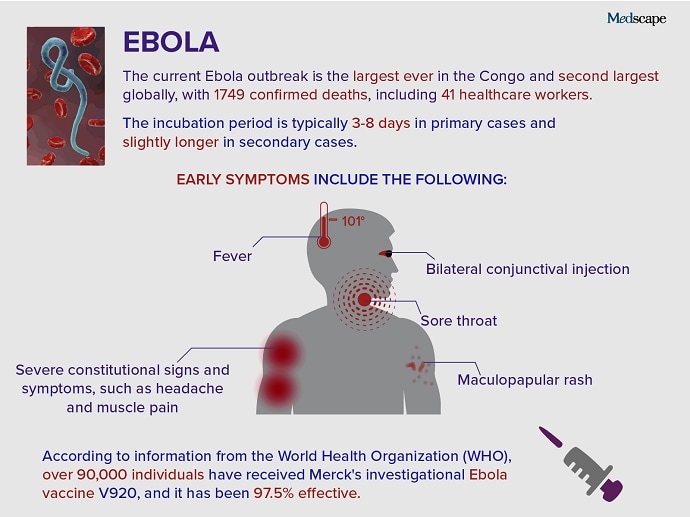Each week, we identify one top search term, speculate as to what caused its popularity, and provide an infographic on a related condition. If you have thoughts about what's trending and why, feel free to share them with us on Twitter or Facebook!
News about promising new drugs, an overview of a major outbreak, and information regarding long-term disease complications helped make Ebola this week's top trending clinical topic.
The US National Institute of Allergy and Infectious Diseases recently announced that a clinical trial of four Ebola drugs was ended early, after preliminary data showed higher survival rates with two of the drugs. During a telebriefing, Jean-Jacques Muyembe-Tamfum, MD, PhD, director-general of the Institut National de Recherche Biomédicale in the Democratic Republic of Congo (DRC), stated, "We will no longer say that EVD [Ebola virus disease] is not curable." He added "This advance will, in the future, help with saving thousands of lives that would have had a fatal outcome in the past." The two drugs, monoclonal antibodies mAb114 and REGN-EB3, will now be used at clinics in the region, while final data analysis from the trial is expected in September or early October.
The ongoing Ebola outbreak is the biggest ever in the Congo and second largest worldwide, with 1749 confirmed deaths, including 41 healthcare workers. Although the current risk for those outside the region is not very high, a recent overview of the situation pointed out that modern society has become so interconnected that once-isolated diseases are now only "a plane ride away." As continued violence in the DRC leads to an increase in refugees fleeing to surrounding countries, the virus remains a worldwide concern. Merck's investigational Ebola vaccine V920 was shown to be 97.5% effective, and although it has not yet been approved by the US Food and Drug Administration, it remains a potential tool should future outbreaks emerge elsewhere.
For those who have survived Ebola, new evidence suggests that significant vitreoretinal pathology requires considerable precautions should these patients need treatment or surgery. The Ebola Virus Persistence in Ocular Tissues and Fluids Study (EVICT) found that uveitis was present in 35.6% of patients, visually significant cataracts were present in 23.2% of patients, chorioretinal scarring was present in 7.8% of eyes, and choroidal thickening was present in 19.6% of eyes. Although the EVICT study found cataract surgery to be safe in this population, the safety of vitreoretinal surgery in these patients is unclear. Experts are recommending that considerable precautions be taken.
The ongoing outbreak in the DRC, treatment options, and future health concerns worldwide led to Ebola's emergence as this week's top trending clinical topic.
Read more about Ebola virus infection.
Medscape © 2019 WebMD, LLC
Any views expressed above are the author's own and do not necessarily reflect the views of WebMD or Medscape.
Cite this: Ryan Syrek. Trending Clinical Topic: Ebola - Medscape - Aug 23, 2019.








Comments